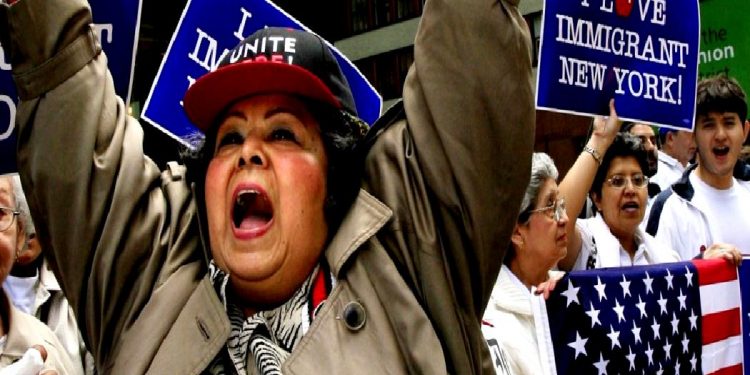Kathy Andrade, RIP

For a century, the American labor movement, taken as a whole, was anti-immigrant, based in part on racism and based in part on the fear of new workers undermining whatever they had won. From Sam Gompers to Cesar Chavez, sharp anti-immigrant rhetoric was the name of the game. This is one of the great shames of the American labor movement.
But today, there’s not really a social movement more aligned with immigrant justice than organized labor. Finally, beginning in the 1990s really, even though there had always been left-leaning pro-immigrant unions, organized labor realized its future, if it had one, was organizing immigrants and people of color. One of the ironies of organized labor and the American working class generally is that for all the attention paid to them by both the unions and the media, white men are always the hardest workers to organize!
Anyway, one of the key players in the transformation of the American labor movement’s position on immigration was Kathy Andrade, who died this week at the age of 88.
Kathy Andrade, a longtime garment union activist in New York City and a native of El Salvador who pushed the labor movement to embrace immigrants rather than view them as threatening the livelihoods of American-born workers, died on July 2 in Manhattan. She was 88.
The cause was cardiac arrest, her husband, Jorge Colon, said.
From the early 1960s to 1995, Ms. Andrade was director of education for Local 23-25 of the International Ladies Garment Workers Union, a large and influential chapter in New York. But the title alone hardly conveyed her impact on her union, which represents men and women in the sewing trades. She embodied the boots-on-the-ground activism and intuitive people skills that helped the union thrive, helping countless immigrant garment workers navigate the path to citizenship, learn to speak English and even broaden their skills by teaching them how to make jewelry.
“She was like the Godfather,” Ana Ramirez, a relative who as a child would visit Ms. Andrade at work in Manhattan’s garment district. “There would be a line of people outside her office, just waiting to get help.”
When Ms. Andrade started with the I.L.G.W.U., many organized labor officials saw immigrants, whether documented or not, as jeopardizing the job prospects and higher wages of union members, the labor historian Rachel Bernstein said in an interview. “Kathy was really instrumental in making sure” that the I.L.G.W.U. “didn’t take that stance,” she said.
Jay Mazur, a former president of the I.L.G.W.U., called Ms. Andrade “the premier advocate for the undocumented.”
She knew the word before anybody else,” he said.
Ms. Andrade successfully pushed Mr. Mazur, who at the time was an organizing director in Local 23-25, to speak publicly in support of undocumented workers and to promote pro-immigration language in union policies, like calling for the federal government to grant the undocumented amnesty.
Muzaffar Chishti, a former I.L.G.W.U. immigration lawyer who is now a senior fellow with the Migration Policy Institute, a Washington think tank, directing its office at New York University’s School of Law, said that in large part because of Ms. Andrade’s work, “the local became the first formal labor entity in the country to fight for the rights of the undocumented.”
“She was not looking at policy,” he said. “She didn’t know what legislation to push, but she instinctively knew that the rights of the undocumented had to be protected if you wanted to protect the rights of all workers.”
The labor movement later caught up with Ms. Andrade, especially as large swaths of the labor force — notably in agriculture, health care and construction — became increasingly composed of immigrant workers. In 2000, the A.F.L.-C.I.O. formally called on the federal government to grant amnesty to an estimated six million undocumented immigrants living in the United States and to eliminate most sanctions on employers who hired them. That proposal and others like it have never found sufficient support in Washington, however.
A true hero of the last half-century and one barely known outside of labor circles.
Rest in Power.
